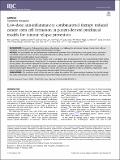Low-dose anti-inflammatory combinatorial therapy reduced cancer stem cell formation in patient-derived preclinical models for tumour relapse prevention
Author(s)
Khoo, Bee Luan; Grenci, Gianluca; Lim, Joey Sze Yun; Lim, Yan Ping; Fong, July; Yeap, Wei Hseun; Lim, Su Bin; Chua, Song Lin; Wong, Siew Cheng; Yap, Yoon-Sim; Lee, Soo Chin; Lim, Chwee-Teck; Han, Jongyoon; ... Show more Show less
DownloadPublished version (4.543Mb)
Terms of use
Metadata
Show full item recordAbstract
Background: Emergence of drug-resistant cancer phenotypes is a challenge for anti-cancer therapy. Cancer stem cells are identified as one of the ways by which chemoresistance develops. Method: We investigated the anti-inflammatory combinatorial treatment (DA) of doxorubicin and aspirin using a preclinical microfluidic model on cancer cell lines and patient-derived circulating tumour cell clusters. The model had been previously demonstrated to predict patient overall prognosis. Results: We demonstrated that low-dose aspirin with a sub-optimal dose of doxorubicin for 72 h could generate higher killing efficacy and enhanced apoptosis. Seven days of DA treatment significantly reduced the proportion of cancer stem cells and colony-forming ability. DA treatment delayed the inhibition of interleukin-6 secretion, which is mediated by both COX-dependent and independent pathways. The response of patients varied due to clinical heterogeneity, with 62.5% and 64.7% of samples demonstrating higher killing efficacy or reduction in cancer stem cell (CSC) proportions after DA treatment, respectively. These results highlight the importance of using patient-derived models for drug discovery. Conclusions: This preclinical proof of concept seeks to reduce the onset of CSCs generated post treatment by stressful stimuli. Our study will promote a better understanding of anti-inflammatory treatments for cancer and reduce the risk of relapse in patients.
Date issued
2019-02Department
Singapore-MIT Alliance in Research and Technology (SMART); Massachusetts Institute of Technology. Department of Electrical Engineering and Computer Science; Massachusetts Institute of Technology. Department of Biological EngineeringJournal
British Journal of Cancer
Citation
Khoo, Bee Luan, Gianluca Grenci, Joey Sze Yun Lim et al. "Low-dose anti-inflammatory combinatorial therapy reduced cancer stem cell formation in patient-derived preclinical models for tumour relapse prevention." British Journal of Cancer (February 2019) 120:407-423 © 2019, The Author(s).
Version: Final published version
ISSN
0007-0920
1532-1827